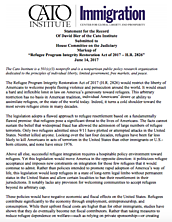The legislation adopts a flawed approach to refugee resettlement based on a fundamentally flawed premise: that refugees pose a significant threat to the lives of Americans. The facts cannot sustain the belief that widespread fraud has allowed the admission of large numbers of refugee terrorists. Only two refugees admitted since 9/11 have plotted or attempted attacks in the United States. Neither killed anyone. Looking over the last four decades, refugees have been far less likely to kill Americans in acts of terrorism in the United States than other immigrants or U.S.-born citizens, and none have since 1976.
Above all else, successful refugee integration requires a hospitable policy environment toward refugees. Yet this legislation would move America in the opposite direction: it politicizes refugee acceptance and imposes new constraints on integration for those few refugees that it would continue to admit. Rather than policies intended to promote rapid adoption of America’s way of life, this legislation would keep refugees in a state of long-term legal limbo without permanent status in the United States and allow certain localities to ban their resettlement in their jurisdictions. It notably lacks any provision for welcoming communities to accept refugees beyond its arbitrary cap.
These policies would have negative economic and fiscal effects on the United States. Refugees contribute significantly to the economy through employment, entrepreneurship, and consumption. While their upfront fiscal costs are higher than for other immigrants, studies have shown that they do eventually become net fiscal contributors. Rather than taking measures to reduce refugee dependence on welfare—such as relying on private sponsorship—or creating policies to encourage faster movement into the labor market—such as validating professional credentials prior to arrival—H.R. 2826 will actually make integration more difficult and costly.


